Choosing the best-adapted water quality for testing
- Like
- Digg
- Del
- Tumblr
- VKontakte
- Buffer
- Love This
- Odnoklassniki
- Meneame
- Blogger
- Amazon
- Yahoo Mail
- Gmail
- AOL
- Newsvine
- HackerNews
- Evernote
- MySpace
- Mail.ru
- Viadeo
- Line
- Comments
- Yummly
- SMS
- Viber
- Telegram
- Subscribe
- Skype
- Facebook Messenger
- Kakao
- LiveJournal
- Yammer
- Edgar
- Fintel
- Mix
- Instapaper
- Copy Link
Posted: 2 September 2020 | MilliporeSigma | No comments yet
In a recent webinar, MilliporeSigma discussed the potential impact of water quality on laboratory results and gave advice on how to select the most appropriate water solution to answer each laboratory’s specific requirements. Here are the highlights…


Purified water plays a critical role in most food and beverage analyses and its consistently high quality is of paramount importance to ensuring accurate and reliable results.
Types of water quality in the laboratory
Tap water contains various trace contaminants which may affect experimental results. In the laboratory, water grades are defined by standards which help ensure that the correct water type is used for a specific application. Type 1 ultrapure water is recommended for sensitive applications, such as HPLC, LC-MS, ICP-MS, and molecular biology. Type 2 pure water is used to prepare microbiological culture media, ELISA buffers, for Kjeldahl tests, and as equipment feed (eg, autoclaves). Type 3 water is the lowest water grade and is used in heating baths and for non‑critical rinsing.
Water purity is frequently described and monitored in terms of resistivity and total oxidable carbon (TOC). Resistivity assesses ionic purity, where a measure of 18.2 MΩ·cm means that the water is ion-free, for example ultrapure water. TOC indicates the total amount of organic material and is expected to be < 5 ppb for ultrapure water.
During the webinar, Dr Estelle Riche, Global Application Specialist for Milli-Q Lab Water Solutions, highlighted various laboratory applications in order to illustrate the potential impact of water contamination, and explained how to select the optimal water quality in each case. She also described how different water purification technologies work to remove specific contaminants.
Choosing the best-adapted water quality for testing
This webinar is available to watch on-demand at a time that suits you!
Water quality for microbiology media preparation
Since water is the predominant component of microbiology media formulations, its purity and consistency of purity can impact the quality of media. Removing contaminants from water is critical when preparing culture media, as impurities can impact bacteria growth or cause abnormalities of the media, such as incorrect pH, wrong colour or precipitation.
For accredited food and beverage testing laboratories, microbiology culture media must be prepared in line with the ISO 11133:2014 standard. According to this, only purified water should be used to prepare culture media. The water should be free of substances likely to inhibit or influence the growth of microorganisms under test conditions. The conductivity of water used should be ≤ 25 μS/cm, preferably < 5 μS/cm, and microbial contamination should be < 103 cfu/mL, ideally < 102 cfu/mL.
The requirements for microbiology media preparation are supported by Milli-Q IX pure water systems, which provide consistently high quality pure water thanks to a combination of purification technologies. Water from this system can also feed lab equipment, such as autoclaves or dishwashers, making it a versatile solution for microbiology laboratories.
Selecting an optimal water solution
When selecting a water system, beyond the need for contaminant-free water that meets the lab’s output and regulatory demands, it is important to consider a variety of additional design features.
The latest Milli-Q water purification systems offer benefits such as ergonomy, intuitive use, simplified data management and environmental sustainability. These water systems have been designed in consideration of a lab’s entire workflow – from performance, to data retrieval, to waste management.
Keynote speaker


Dr. Riche holds an engineering degree in chemistry from ESCOM (France) and a PhD in chemistry from the University of North Carolina at Chapel Hill (USA).
Prior to joining Millipore SAS 14 years ago, she was an assistant professor in the School of Dentistry at UNC for four years. She is currently a Global Application Specialist for Milli-Q® Lab Water Solutions, based in Guyancourt, France. Her responsibilities include understanding the potential impact of water contaminants on the results of laboratory tests and providing support to scientists regarding the optimal use of purified water in their experiments.
Issue
Related topics
Food Safety, Quality analysis & quality control (QA/QC), Water





